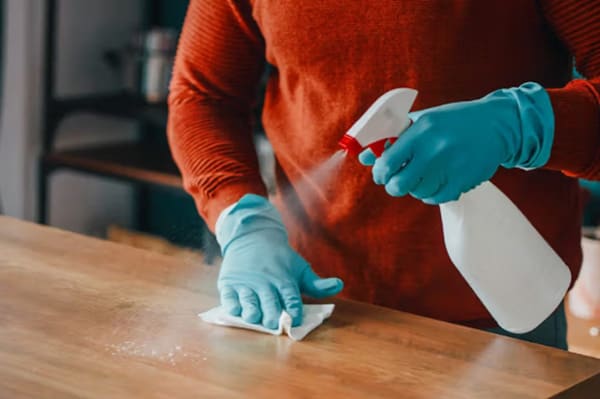In the quest for safer, non-toxic cleaning solutions, many households have turned to natural disinfectants like vinegar and hydrogen peroxide. Both are praised for their ability to clean and disinfect surfaces without the harsh chemicals found in many commercial products. But when it comes to killing germs, bacteria, and viruses, which one is more effective? This article compares vinegar and hydrogen peroxide to determine which disinfects better.
The Science Behind Vinegar as a Disinfectant
Vinegar, particularly white vinegar, is composed mainly of acetic acid, which is known for its antimicrobial properties. Acetic acid can break down cell membranes, making it effective against some bacteria and viruses. Vinegar has been used for centuries as a natural cleaning agent, and its ability to cut through grease and grime is well-documented. However, its effectiveness as a disinfectant is a bit more complex.
While vinegar is effective against certain types of bacteria, such as E. coli and Salmonella, its ability to kill viruses and more resistant bacteria is limited. Studies have shown that while vinegar can reduce the presence of some pathogens, it is not as potent as other disinfectants, particularly against more resilient microorganisms like norovirus or the influenza virus. Therefore, while vinegar is a good cleaner, it may not always provide the level of disinfection needed in some situations.
Hydrogen Peroxide: A Potent Disinfectant
Hydrogen peroxide (H₂O₂) is a powerful oxidizing agent, meaning it works by releasing oxygen that attacks and breaks down the cell walls of microorganisms. This makes hydrogen peroxide effective against a wide range of pathogens, including bacteria, viruses, and fungi. It is commonly used in a 3% solution for household disinfection and is known for leaving no harmful residues as it breaks down into water and oxygen.
Hydrogen peroxide’s effectiveness as a disinfectant is well-supported by scientific research. It is particularly effective against viruses, making it a strong candidate for disinfecting surfaces during flu season or amid other viral outbreaks. Unlike vinegar, hydrogen peroxide can kill a broader spectrum of pathogens, including more resistant strains of bacteria and viruses. This makes it a more reliable choice for situations where thorough disinfection is required.
Comparing Disinfection Efficacy
When it comes to comparing vinegar and hydrogen peroxide in terms of disinfection efficacy, hydrogen peroxide generally comes out on top. Here’s why:
1. Spectrum of Effectiveness: Hydrogen peroxide is effective against a wider range of pathogens, including both bacteria and viruses. It has been shown to kill many types of bacteria, including Staphylococcus aureus and Escherichia coli, as well as viruses like rhinovirus (the common cold virus) and influenza. Vinegar, while effective against some bacteria, does not have the same broad-spectrum efficacy, particularly against viruses and more resistant bacteria.
2. Speed of Action: Hydrogen peroxide works quickly, often needing only a few minutes to disinfect a surface effectively. It’s generally recommended to allow hydrogen peroxide to sit on the surface for 5 to 10 minutes to ensure complete disinfection. Vinegar, on the other hand, may require a longer contact time to achieve a similar level of bacterial reduction, and even then, it may not be as effective against certain pathogens.
3. Residue and Safety: Both vinegar and hydrogen peroxide are safe to use in households, especially around food preparation areas. Hydrogen peroxide breaks down into water and oxygen, leaving no residue, while vinegar may leave a slight acetic acid residue, which can be rinsed away easily. However, vinegar’s strong smell can be off-putting for some, whereas hydrogen peroxide is virtually odorless.
4. Material Compatibility: Vinegar is acidic and can be corrosive to certain materials, particularly stone surfaces like marble and granite. It can also dull the finish on some surfaces over time. Hydrogen peroxide is generally safe on most surfaces but can cause discoloration on fabrics and certain metals if not used properly.
Practical Uses and Recommendations
While hydrogen peroxide is the more effective disinfectant, vinegar still has its place in the home as a natural cleaner. For routine cleaning, such as wiping down countertops, cleaning windows, or removing mineral deposits, vinegar is a great option. It’s non-toxic, environmentally friendly, and effective at cutting through grease and grime.
For situations where disinfection is key—such as during cold and flu season, or when cleaning areas that come into contact with raw meat—hydrogen peroxide is the better choice. Its ability to kill a wider range of pathogens quickly makes it more suitable for these scenarios.

Conclusion
In the battle of vinegar versus hydrogen peroxide for disinfection, hydrogen peroxide is the clear winner. Its broad-spectrum efficacy, speed, and safety make it the preferred choice for disinfecting surfaces in the home. However, vinegar still holds value as a natural cleaner and can be used for many everyday cleaning tasks. For those seeking a non-toxic and effective way to keep their homes clean and germ-free, incorporating both vinegar and hydrogen peroxide into their cleaning routine can offer the best of both worlds.